
Marshal Massena
Armee de Sud
44,160 inf
11,200 cav
72 guns
BATTLE OF LEIPZIG
JULY 4th, 1811


Archduke Charles
Oesterreichische Grosse Armee
85,440 inf
10,560 cav
78 guns
|
44,160 inf |
BATTLE OF LEIPZIG JULY 4th, 1811
|
85,440 inf
|
The Austrian army of the Archduke Charles had been marching from
Linz since the start of the war at the beginning of June. The army secured the
conquest of Salzburg and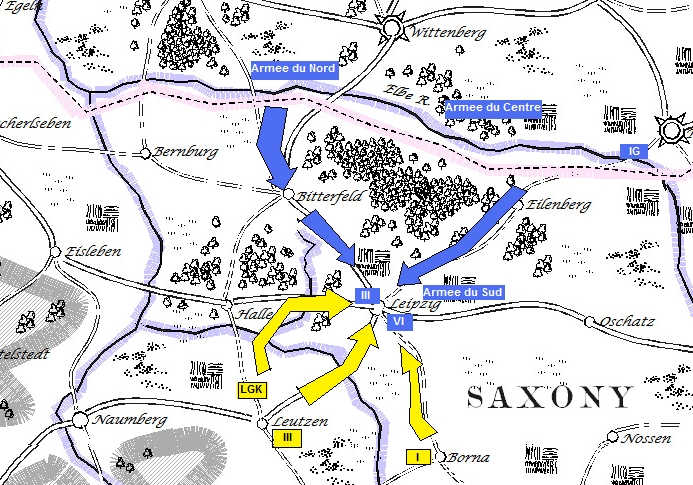 Bavaria and then swung north to join the fight against the French in Saxony. By
June 22nd they were in Bayreuth but from there, they advanced cautiously, having
no communication from their allies to know the situation. Finally, on June 29th,
the Austrians and French Armee de Sud made contact near Leutzen and Borna. Two
days later, word reached Charles of the repulse of the Napoleon from Berlin on
June 30th.
Bavaria and then swung north to join the fight against the French in Saxony. By
June 22nd they were in Bayreuth but from there, they advanced cautiously, having
no communication from their allies to know the situation. Finally, on June 29th,
the Austrians and French Armee de Sud made contact near Leutzen and Borna. Two
days later, word reached Charles of the repulse of the Napoleon from Berlin on
June 30th.
Archduke Charles acted swiftly now, ordering the whole of his force to march on Leipzig. If Napoleon was north of the Elbe, Massena would be unsupported. It was an opportunity that Charles could not allow to pass. The French were pushed back from Leutzen and Borna after brief engagements and then the Austrian army advanced on Leipzig.
Napoleon meanwhile had ordered his armies to move south immediately following the check at Berlin. While on the battlefield, the Emperor had received initial reports of first contacts with the Austrians south of Borna. On the second, with the Grand Armee still north of the Elbe, word came from Massena that he expected a battle to be fought at Leipzig on the 4th of July. Couriers were hurriedly sent to Marshals Davout and Ney to get any available troops to Leipzig at haste. The armies of the French though were fatigued and congested, and also were trying to deal with maintaining sieges at Wittenberg and Torgau. Although some twenty divisions were given orders to march for Leipzig, few would arrive in time to participate in the fight.
Marshal Massena did not know how many reinforcements he would receive. Napoleon had sent word assuring him of support and had even pledged to arrive in person but there was no sign of the Emperor. Anchoring his right on the major town, he deployed to cover the roads to Eilenberg and Bitterfeld. Orders were passed that he had no intention of fighting an entirely defensive battle. Indeed, he had selected the place to meet the enemy that was open and featureless, in order to be able to attack if need be and to leave the Austrians with no defensive terrain. There was also a concern in Massena's mind that there might be Russians or Prussians arriving in the east at any time. The orders were straightforward: engage and defeat the Austrians to your front.
Complicating Charles' battle plan was years of experience fighting against the French. He was fearing large numbers of French reinforcements and so could not act too aggressively in the early hours. As well, his veteran grenadiers of the Liebegarde Korps had not yet arrived. Their commander, ordered from Leutzen to Leipzig, had selected the road through Halle when the roads were too congested. As well, the artillery of I Korps and a strong division of infantry from the corps were still not on the battlefield. The plan was to advance to engagement and try to make inroads against the garrison at Leipzig, in order to aid the grenadiers in fighting through that town when they arrived in the afternoon.

The French deployed in lines, making clear signal to the Austrians that if they wanted to fight, they would need to come to them. Both sides deployed their cavalry behind the infantry in support roles.
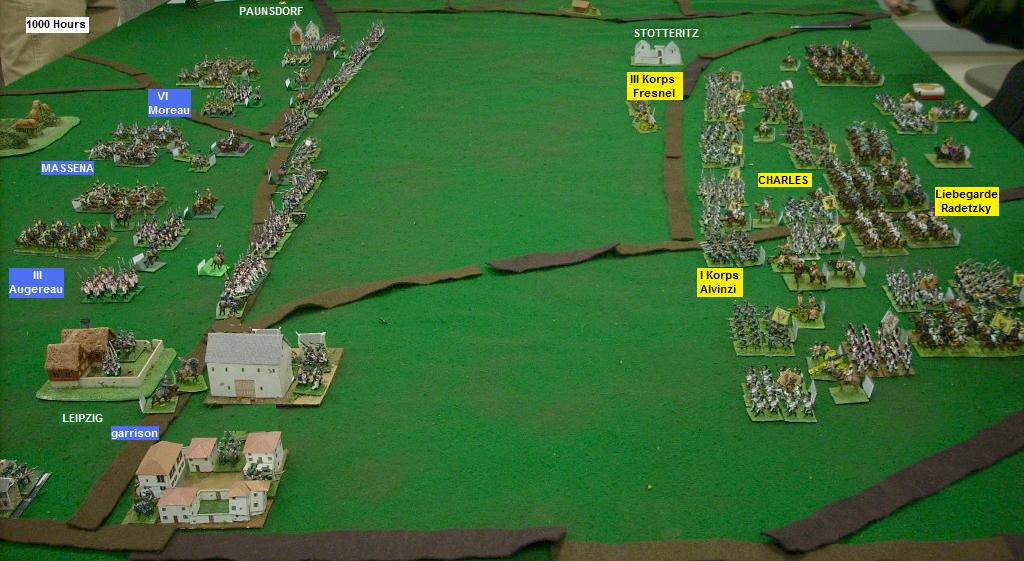
The early advances of the Austrians were only slightly stalled by French cannon fire. They had numerical advantage and their columns were able to continue moving forward because of it. Archduke Charles was not at all surprised to see clouds of dust rising in the northeast, indicating troop movements from the direction of Eilenberg.
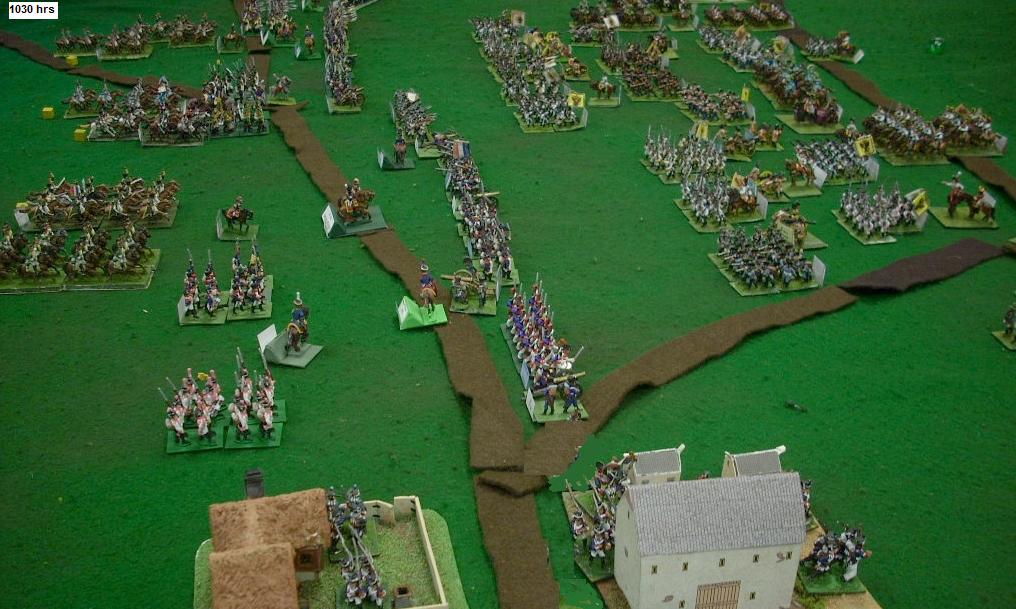
When those French reinforcements turned out to be the Imperial Guard, Charles' earlier caution appeared justified. Also, it appeared that more reinforcements of some kind were coming from Bitterfeld in the northwest. The Leipzig garrison on the French right was sending messages to Marshal Massena informing him that Austrian reinforcements were crossing the marshes and approaching the town from the west. To meet this threat to his right flank, the French commander would order the infantry reserve of III Corps to move west. His orders to the Imperial Guard, just now arriving on the field of battle, was to deploy to the crossroads to their front.
General Alvinzi would make an attempt to launch a brigade of Grenadiers against Leipzig but it would be sent reeling back in confusion. The would rely instead upon artillery and infantry fire to suppress the blocks of Leipzig.
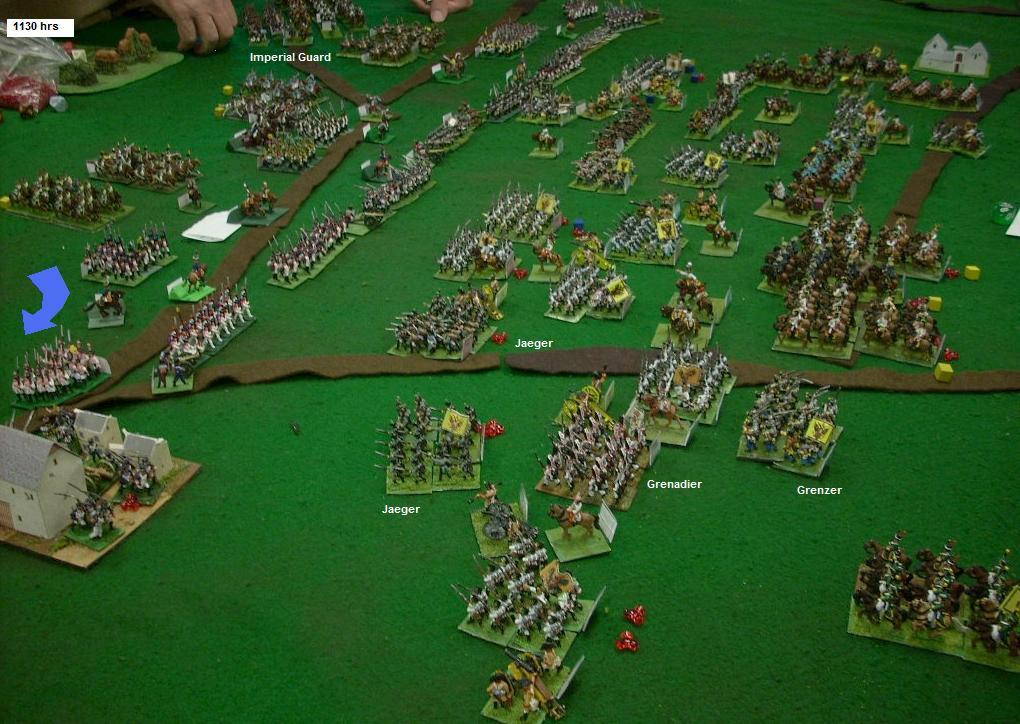
A crisis begins to develop on the French right. Mass and accurate fire from Austrian Jaeger and artillery is causing devastating losses to the men of 11th division. The Austrian Liebegarde artillery has deployed a gun line in the center and this is wreaking carnage on the 9th infantry division. With the reserve of III Corps already committed to Leipzig, the Imperial Guard would be ordered to support III Corps.
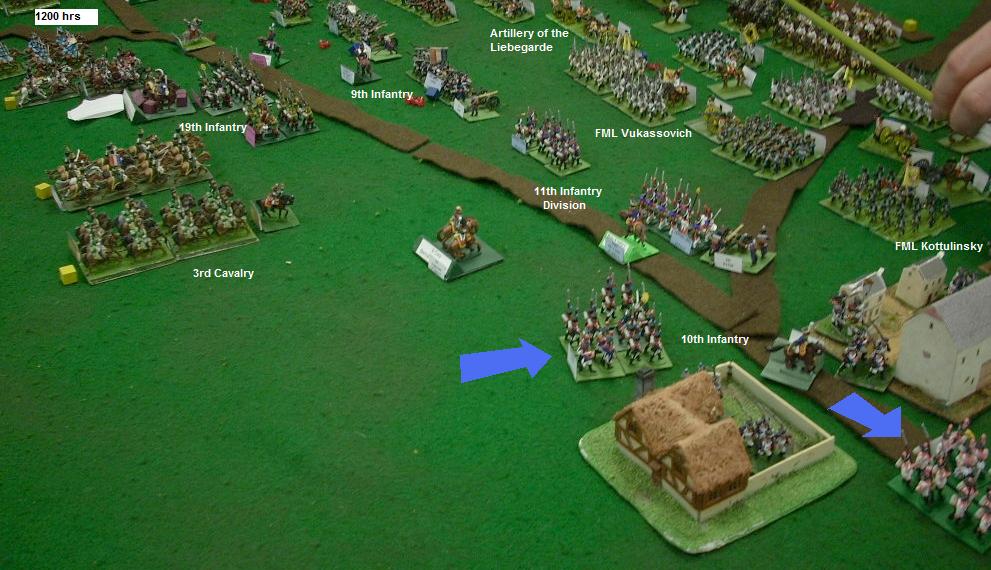
On the eastern flank, the French would achieve good effect with their artillery on the far end, keeping the Austrian cavalry under harassing and disordering fire all morning. The Austrians would deploy into line to meet the French and both sides settled into an extended firefight.
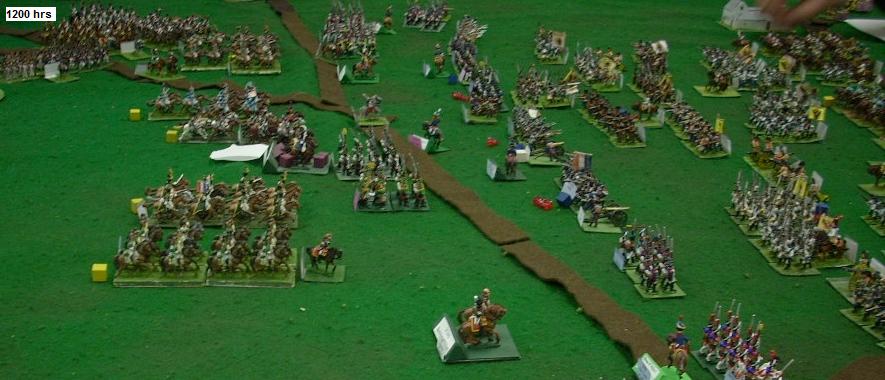
Five brigades of Austrian grenadiers launched assaults across the bridges and into the heart of Leipzig. The garrison commander and the general de division for the 10th both proved to be sterling commanders and the grenadiers would be put through tough fights. The buildings themselves were stout and the narrow streets made advancing against them difficult. As the Austrian fire from I Korps began to disperse the men of French 11th division, 10th division would be obliged to turn one of two brigades sent to defend Leipzig back into the line against I Korps.
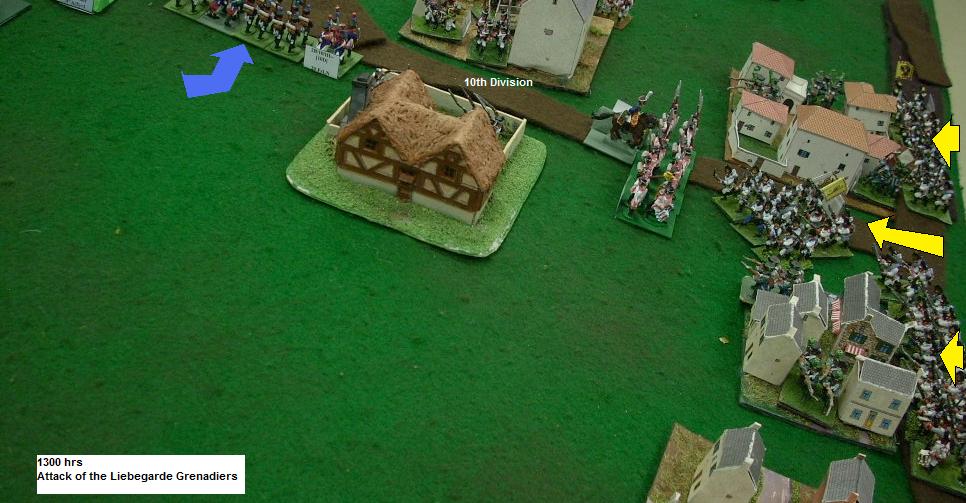
The Grenadiers would have mixed results. Though they would secure one block of Leipzig in the north, they were repulsed in the south. The Austrian Grenadier formations were to large to allow proper formation changes. Austrian I Korps, having been achieving great success against the French by firepower, opt to continue with what is working and do not advance but instead stand back and rely on musketry and artillery. Augereau's III Corps is on the breaking point but it still holds.
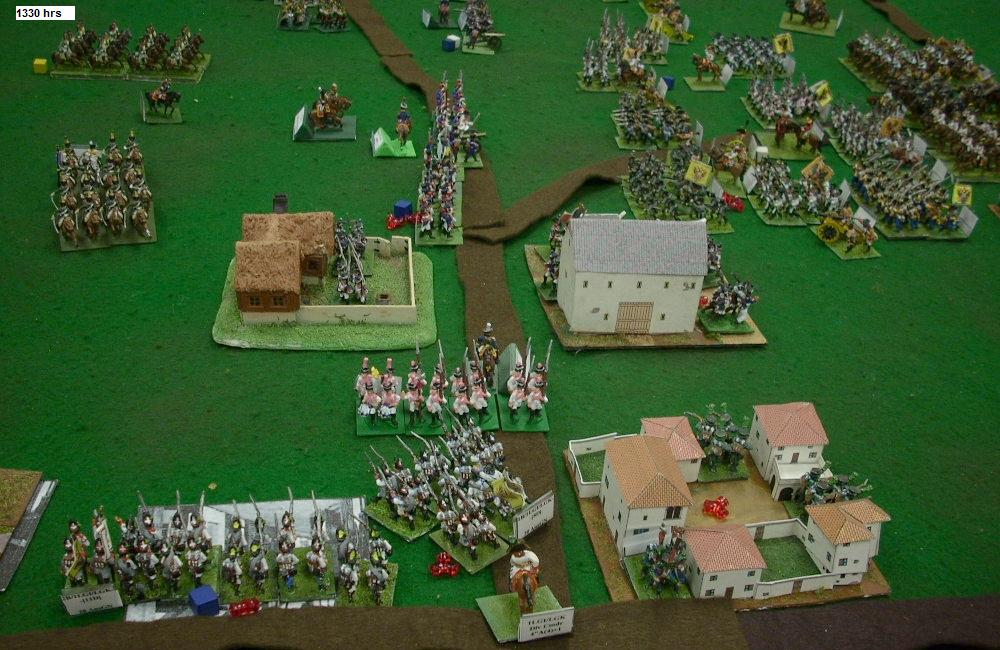
On the French left, artillery superiority has been won and the Austrians are losing the firefight. The Cavalry of the French Imperial Guard senses an opportunity and charges forward, sabering an Austrian infantry brigade and sending an artillery crew scampering to the rear, abandoning their artillery. The Poles would not heed any recall attempts and press on, smashing through another brigade but halting there disordered and blown.
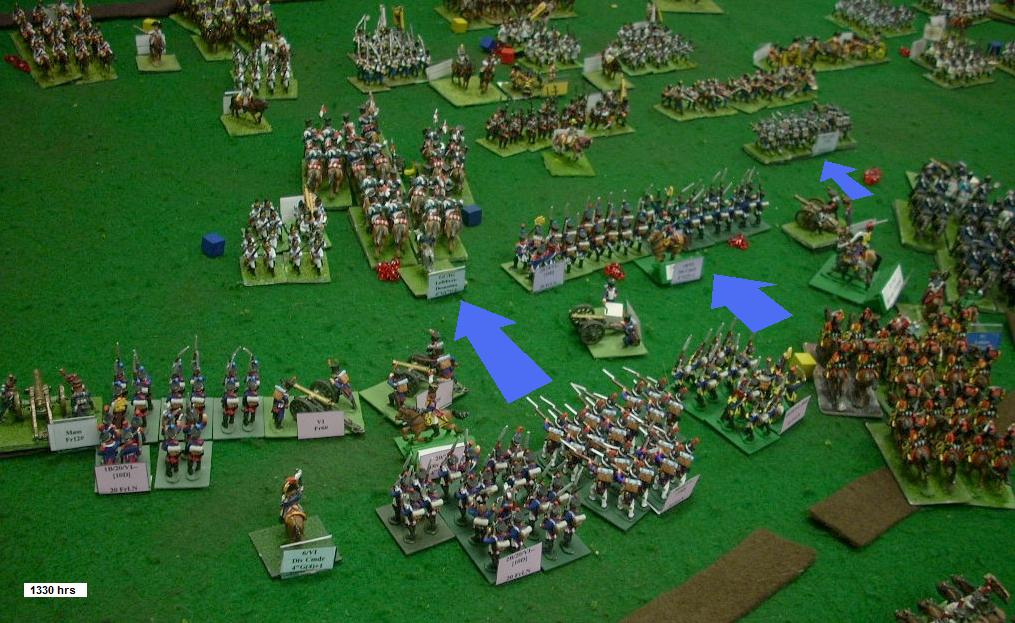
The charge of the Polish lancers would spur Marshal Massena into the offensive. Wile French III Corps could not participate, I Corps and the Imperial Guard launch attacks against the Austrians all across the line. The French seize the initiative and press forward again and again (read: Massena turned in the initiative to get a double turn).
The massed cavalry of the Liebegarde Korps cannot support their charged artillery because their Corps Commander is off trying to win the battle for Leipzig town.
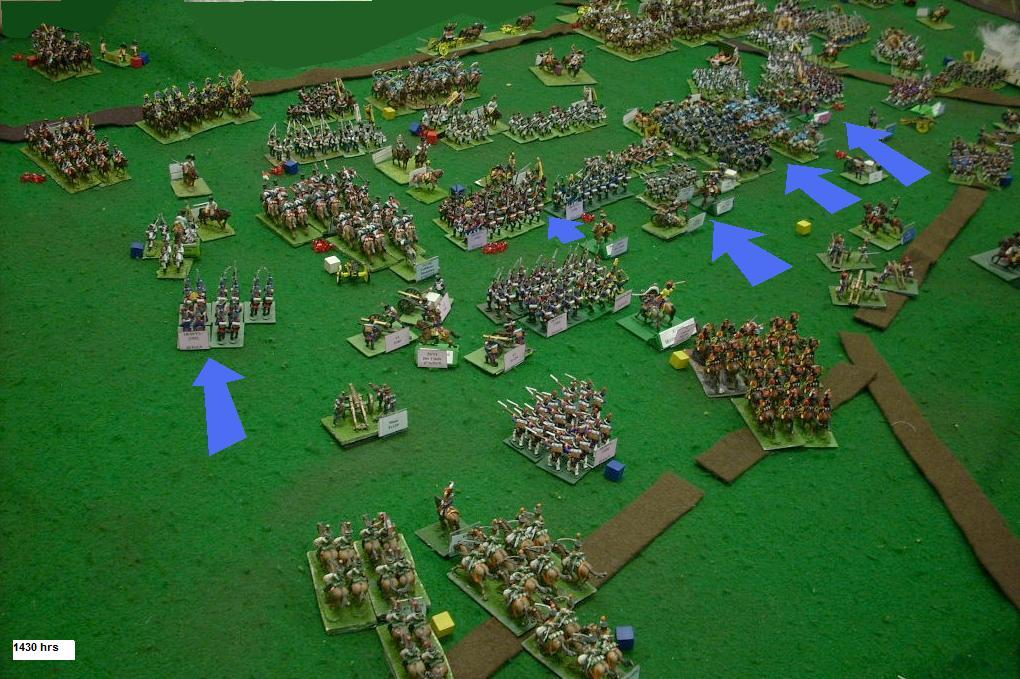
Archduke Charles is startled when his battle line seems to crack in the blink of an eye. On the Austrian left, despite having had the luck to set a block of Leipzig afire, when the French managed to regain deployment in the southwest block, the Grenadiers give up the attacks against that strong point and they just run, pell-mell, to regain the Austrian lines and try to solve the command and control problems.
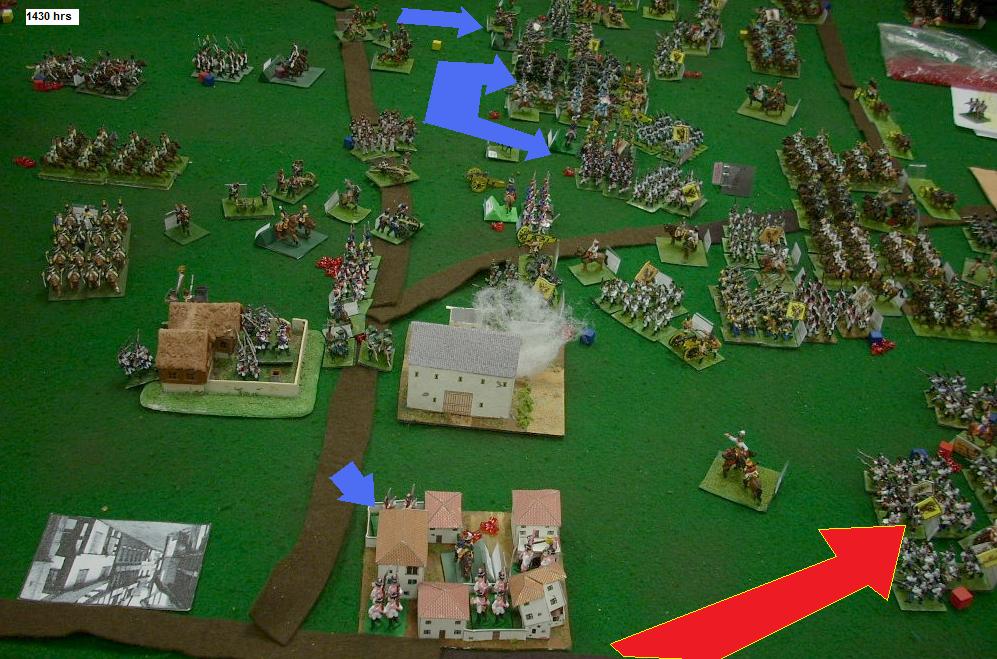
The Austrian army is still intact, its cavalry almost entirely fresh, but Charles does not see a way to turn this into an Austrian victory now. Too much damage has been done to the infantry and artillery of III Korps. Also, with the French Imperial Guard on the attack, the Austrians have little stomach to try to fight it. Orders are given to retreat the Austrian army south to Leutzen and Borna. The retreat would be well covered by cavalry but Charles' army has suffered.
Critically for the war, the Austrians are pushed back and are unable to make contact with their coalition allies. Charles had no reason to expect any Russian or Prussian reinforcements but French were certain to get more on the morrow.
| Campaign System Estimated Force | Battlefield Estimated Force | Campaign System Estimated Casualties | Battlefield Estimated Casualties | |
| Austrians | 84,000 | 96,000 | 15,000 | 17,000 |
| French | 68,000 | 55,000 | 10,000 | 8,000 |